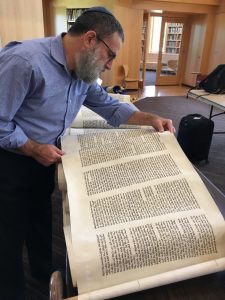My Summer Reading – A Weekly Letter From Rabbi Davis – July 27, 2018
Shalom Chaverim,
I have a stack of books on my office floor that I am hoping to read. There are books about art, Jewish history, Israeli politics, the Hebrew Bible, and more. I am probably overly ambitious with how much I will actually read. So far this summer, I have only gotten to one book- The Lost Book of Moses by Chanan Tigay.
In 1893, Jerusalem archeological treasure hunter, Moses Wilhelm Shapira, arrived in London claiming to have discovered the world’s oldest Bible scroll. Written centuries before the Dead Sea scrolls, this scroll contained numerous variations from today’s accepted Torah text. Shortly before the British Museum could acquire it, however, it was denounced as fake. Humiliated, Shapira fled the country. Six months later, he was found dead and the scroll went missing.
Tigay, a journalist and professor at San Francisco State University, tells the true and intriguing story of his years-long search for the oldest copy of the Torah. Reading through The Lost Book, it was not always easy to keep the various manuscripts or complicated web of relationships straight in my mind. But I couldn’t wait to find out if the scroll was ever found and if it was real. I won’t ruin the ending.
It was fascinating learning about the origins of modern archaeology and comparing alternative versions of the Ten Commandments. But you don’t have to look to extra-biblical manuscripts to discover variations of the Torah text. We see variants within the Torah itself.
In this week’s parasha, for example, we read the Ten Commandments. The tenth commandment prohibits coveting saying, “You shall not covet your neighbor’s wife. You shall not crave your neighbor’s house, his field, his slave, his ox or anything that is your neighbors” (Deut. 5:18). That is slightly different than what we read in Exodus: “You shall not covet your neighbor’s house: his wife, his slave, his ox or anything that is your neighbors” (20:14).
 In the Exodus version, the wife is included as part of your neighbor’s house along with the slave and the ox. In the Deuteronomy passage, she is separate from her house. Scholars claim the Deuteronomy text was written later than the Exodus text. Thus, as Prof. David Frankel of the Conservative movement’s Schechter Institute of Jewish Studies in Jerusalem explains: “We can see how the sacred text of the Decalogue is changed and amended to express an evolving sense of morality- the independent worth of the woman.”
In the Exodus version, the wife is included as part of your neighbor’s house along with the slave and the ox. In the Deuteronomy passage, she is separate from her house. Scholars claim the Deuteronomy text was written later than the Exodus text. Thus, as Prof. David Frankel of the Conservative movement’s Schechter Institute of Jewish Studies in Jerusalem explains: “We can see how the sacred text of the Decalogue is changed and amended to express an evolving sense of morality- the independent worth of the woman.”
As moderns, we might be put off by the fact that the Ten Commandment is addressed only to the husband. At the same time, we can be heartened to see the evolution within the Torah itself moving in the direction of greater gender justice. In that sense, perhaps what matters most is not discovering an old Torah but appreciating that it is a living Torah.
L’Shalom,
Rabbi Alexander Davis
adavis@bethelsynagogue.org
Pictured: Recently, Rabbi Moshe Dulin examined some of Beth El’s Torah scrolls checking for areas in need of repair.
